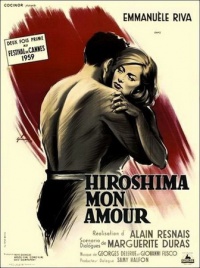Hiroshima mon Amour (1959)
Understanding the Concept of Memory in Disparate Cultures[edit]
Hiroshima Mon Amour, a screenplay written by Marguerite Duras and directed by Alain Resnais, was the recipient of the Special Jury Prize at the Cannes Film Festival in 1959, and served as a major catalyst for the Nouvelle Vague (French New Wave) cinematic movement. The film centres on an affair between a Japanese architect and a French actress filming in Hiroshima, and explores different cultures and the difficulty we sometimes experience in attempting to reconcile our understanding of memory and history with disparate cultures. Resnais uses the fictional situation of the two lovers to critique the impossibility of truly knowing an Other; the backdrop of the atom bomb being dropped on Hiroshima underlines the disparity between Western and Japanese recollections of the atrocity. The film explores the universal themes of love, war, and culture, but should be viewed as a plea for peace and the abolition of warfare. As such, it demonstrates the importance of international cooperation, showing the dangers of what can happen when socio-cultural conflicts are allowed to develop and mutate.
